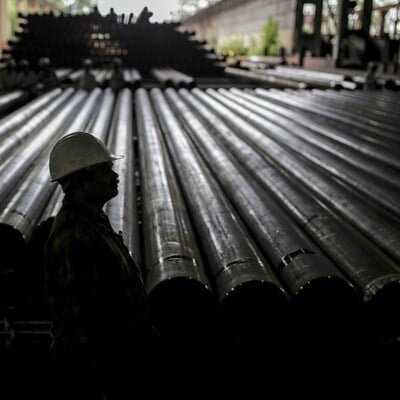Its development is set to squeeze operating margins across the steel sector. Photo Bloomberg
The implementation of the new mining tax by some states following the Supreme Court ruling may pose challenges for the domestic steel industry by increasing cost pressures, according to rating agency ICRA.
On August 14, the Supreme Court upheld states’ authority to impose taxes on mineral rights and mineral-producing lands, and allowed them to seek royalty refunds from April 1, 2005, onwards.
This development will compress operating margins across the sector, impacting both primary and secondary steel producers, ICRA said in a note.
While primary steel producers’ margins could shrink by 60 to 180 basis points, secondary producers could face a more severe impact, with margins declining by 80 to 250 basis points, under various scenarios in which tax rates could vary between 5 and 15 percent.
The power sector, which is heavily dependent on coal, could see a rise in supply costs of 0.6 to 1.5 percent, which could lead to higher retail tariffs. In addition, primary aluminium producers will also be affected due to their high energy consumption.
“Implementation of the new mining tax by major mineral-rich states may increase cost pressures for the steel industry. While most states are yet to set the rates, any substantial tax implemented could negatively impact margins, especially for secondary steel producers, as merchant miners are expected to pass on the higher costs,” said Girishkumar Kadam, Senior Vice President and Head of ICRA’s Corporate Sector Ratings Group.
According to ICRA, the recent Supreme Court judgment has once again brought into focus the Orissa Rural Infrastructure and Socio-Economic Development Act, 2004 (ORISED), which allows a 15% tax on iron ore and coal. If fully implemented, it could lead to an 11% increase in landed costs of iron ore, directly impacting the cost competitiveness of domestic steel companies.
In a related move, the Jharkhand government recently imposed a Rs 100 per tonne hike on iron ore and coal, setting a precedent that other states could follow. This increase is expected to have minimal impact on operating margins of steel entities, reducing them by 30-40 basis points.
(Only the headline and image of this report may have been reworked by Business Standard staff; the rest of the content is auto-generated from a syndicated feed.)
First published: August 26, 2024 | 14:35 IS
Disclaimer:
The information contained in this post is for general information purposes only. We make no representations or warranties of any kind, express or implied, about the completeness, accuracy, reliability, suitability or availability with respect to the website or the information, products, services, or related graphics contained on the post for any purpose.
We respect the intellectual property rights of content creators. If you are the owner of any material featured on our website and have concerns about its use, please contact us. We are committed to addressing any copyright issues promptly and will remove any material within 2 days of receiving a request from the rightful owner.

